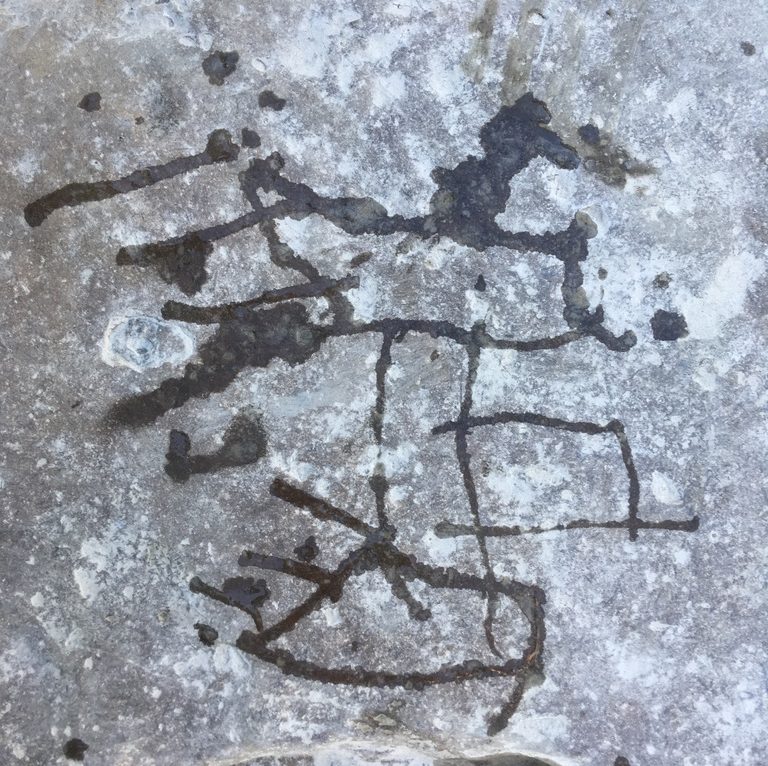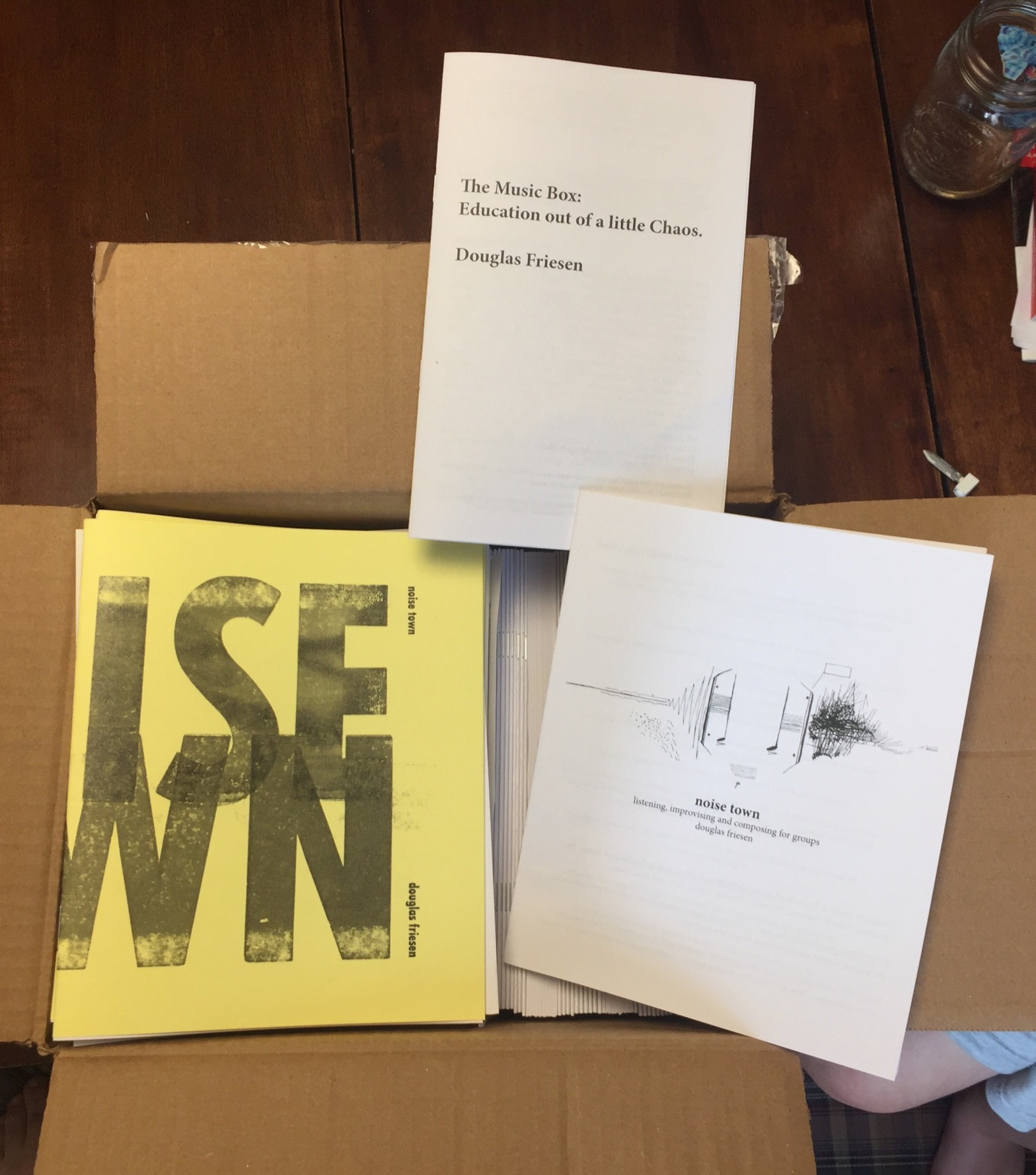focussed listening
Listen.
Reflect, breathe, journal, discuss, record
What is the furthest sound you can hear?
What sounds are close by?
What is the quietest sound you can hear?
Which sounds are noisy? Which are “musical”?
What is your favourite sound? Which location sounds best? Share it with others.
Is there form in what you are hearing?
What do you hear? What do you like? What might you change?
What was the earliest sound you remember hearing?
What sounds from your life are now lost?
I just had an amazing and creative week with 5 to 16 year old string players at Cadenza Summer Music Week in Winkler, Manitoba. Improvisation games, compositions with the trees and wind, compositions of Fred Frith, Pauline Oliveros and R. Murray Schafer. Thank you Rochelle, organizers, teachers and students!
electronics in public ed
deschooling society – ivan illich
“…the right to learn is curtailed by the obligation to attend school.”
“The pupil is thereby ‘schooled’ to confuse teaching with learning, grade advancement with education, a diploma with competence, and fluency with the ability to say something new.”
“Most learning happens casually, and even most intentional learning is not the result of programmed instruction.”
“The very existence of obligatory schools divides any society into two realms: some time spans and processes and treatments are ‘academic’ or ‘pedagogic,’ and others are not. The power of school thus to divide social reality has no boundaries: education becomes unworldly and the world becomes noneducational.”
“The school system today performs the threefold function common to powerful churches throughout history. It is simultaneously the repository of society’s myth, the institutionalization of that myth’s contradictions, and the locus of the ritual which reproduces and veils the disparities between myth and reality.”
interactive soundwalk
On November 5th I’ll be leading an interactive soundwalk in Niagara Falls, Ontario. It is a workshop within the Ontario Music Educators’ Association conference.
A few weeks ago I led a two day workshop in Guadalajara and last January I taught for a week in Rio De Janeiro. Both of these opportunities have come my way because Schafer’s work is so well known in these cities and he is not wanting to travel at this point. In both cases, amongst many other things, we performed soundwalks in the downtown areas in which we were meeting. The teachers, professors, and musicians created fun and serious pieces based on what we heard, making comment on/interacting with the soundscape around them. I have shied away from doing this in Canada but feel very encouraged by these experiences.
I have some ideas as to how we might interact with the sound of the falls and looking forward to hearing what the participants think might work.
World Listening Day – 2016
Soundwalk – Mexico City, March 2014
At the end of a week of soundscape listening and interaction games we decided to go for a soundwalk.
And just listen.
I’m not sure why I did not suggest starting the week this way. I think I just didn’t feel confident enough. Some of the 60 participants had driven upwards of 20 hours to work with Murray and I. To ask them all to start by walking silently together seemed too risky. Would they would know why?
They can read Murray’s books on their own but here wanted to feel through the work together. (Carmen Mendez of Costa Rica put it this way after a workshop I led in Rio De Janeiro).
We walked through the busy school, past many students and teachers, past other festival workshops and performances, down a small cobblestone street, past a large construction site, and across a large busy Mexico City street. It was here that I began to let go of wondering what the participants thought of this and started experience it along with them.
60 musicians, teachers, and administrators walking silently together, making a statement.
Shh…we are listening.
We most definitely had an effect on our environment. Crowds almost ceremonially cleared the way for us and watched with theatrically inquisitive faces.
The whole construction site seemed to halt as we passed by. Hammers paused in mid air, cranes silently swung on stopped cables, men holding charts looked up in wonder.
Our walking seemed powerful. The scope of Murray’s influential thinking was revealing itself to me more and more. In a way he composed the soundwalk. Horns halted as we passed, squinting drivers become patient in their curiosity as we crossed the large street.
We continued away from the street into a quieter residential square in the Coyoacan neighbourhood of the city. In front of a modest old church we formed a circle and continued listening for a time. Through an earlier decision we started into a version of Pauline Oliveros’ Teach Yourself to Fly, each closing our eyes to concentrate on our breath. At various moments we each began to sound while breathing out, shifting, imitating, contrasting each others sounds as well as those from the soundscape around us.
As this piece came to end I asked Murray to stand from his park bench and lead us in his Wolf Chant. 60 of us howling, stomping, and chanting in unison.
Ontario Wolves brought south to Coyoacan (place with coyotes).
As Murray’s enormous energy waned, I nodded to end the week long course. We applauded the powerful group experience, feeling fulfilled, thanking each other and wishing well.
I feel fully changed.
Transformed our environment by just listening.
grab hold
Music won’t die if we stop teaching it.
The battle is not getting kids to like music.
excerpt from Canadian Music Educator Column
During workshops or schools visits I have, at times, been told that all music education is creative. I challenge whether asking students to help decide where to breath in a section of The Planets is keeping their creativity and sense of exploration alive. Fear might just stand in the way of music education becoming a truly creative experience for both students and teachers. Rehearsing and performing the rep can be great but take a moment, breathe, let go and try truly creating something. Some ideas:
Compose a vocal piece based on a mode of transportation. Use that word and the sound of that mode of travel only. Ensure there is a beginning, a middle, and an ending.
Create an ABA piece using only 1 note each.
Compose a piece of music that is exactly thirty seconds long that explores one of the following.
Higher and slower sounds
Longer and quieter sounds
Faster and lower sounds
Shorter and louder sounds
Compose a short piece based on the first and last sounds you heard yesterday. Include some silent moments.
Compose a piece of music using an instrument you’ve never played.
Describe how a piece of music could start, how it might shift and develop and how it might end, then pick a group of instruments to improvise accordingly. Comment on their attempt and ask them to try it again.
Compose music for the start of the school day and perform it in the foyer as students are walking in.
Make a soundtrack to a favourite poem.
Attempt to create the longest crescendo that ends with an abrupt cut off followed by silence.
Silently but passionately pretend to play your instruments just to confuse a late student or teacher.
Use a scene from a Shakespeare play as your music. Improvise your characters part on your instrument. Play out the scene. How did it go? Try again.
Shout all together, play a quiet long note, stop, play a loud short note, 1/8 notes on a Bb major triad slowly getting louder then end with a long tone cluster. Reflect, decide what you want to do differently/better, then try again (even if it is completely different).
Create an introduction to a favourite piece that you have been rehearsing. Think about what might sound good before the actual start. Try an outro. Try adding a new section in the middle.
Search for a truly happy sound, a sad one, a surprising sound, an unsure sound, a lonely sound, end again with your happy sound.
Improvise the sounds of a nearby park, start and stop together. What did you like, what did you not like? What would you change? Try it again and hope for more to like.
Together as a class, compose a piece of music for a special occasion (Remembrance Day, Halloween, Thanksgiving, etc.).
Adjust any of the above to fit your class.
2nd annual esme festival
Dear Music Colleagues,
esme (expanding success in music education) in partnership with the tdsb is pleased to invite you to participate in our second annual non-competitive music festival. Last year was a blast and we hope to continue the fun as well as add a few things (set of evening performances for small groups, jam rooms, etc.)
This event, which will be held at C.W. Jefferys C.I. (TDSB) on Thursday, February 26th, 2015, is open to all school boards and all varieties of musical ensembles. We are excited to add an evening option for small groups which will take place at The Tranzac (292 Brunswick Ave, Toronto) on February 27th.
Often, in order to engage all of our students we find ourselves teaching classes or running extra-curricular groups with very non-traditional instrumentation, structure, or repertoire, which can make it difficult to find performance opportunities for our students. It is our hope that this festival will give your school a chance to showcase different groupings and/or styles of musical programming, including, but certainly not limited to, rock band, improvisation, hip-hop, DJ-ing, composition/arranging, sound exploration, rap, and unique instrumentation.
Participating in this festival, students will have a chance to perform for their peers, hear other student music, and receive meaningful feedback in a very relaxed and supportive environment. Following performances, students will take part in interactive workshops with guest artists. Already confirmed for this event is musician Dave Clark (Woodshed Orchestra, Gord Downie, Rheostatics).
Below is a tentative look at the schedule for the day (26th):
8:30-9:30am Check in/set-up
9:30-11:30am Morning Session
11:30-12:30pm Lunch Break (students should pack a lunch for this day)
12:30-2:30pm Afternoon Session
And for the evening (27th): 7pm doors, and 8pm performances start
Finally, we would also like to keep this festival very student focused. For this reason, we ask that each ensemble assign a student mc to introduce/speak on behalf of their group.
Thank you for your interest and support. If you have any questions, please email douglas.friesen@tdsb.on.ca or kayla.garrett@tdsb.on.ca.
Sincerely,












